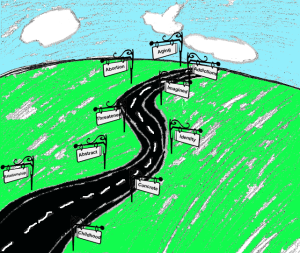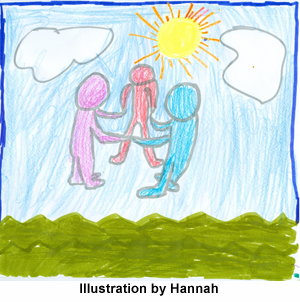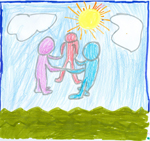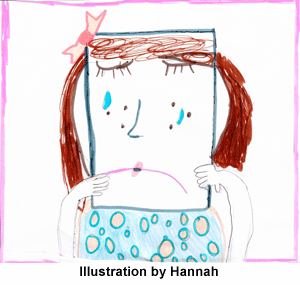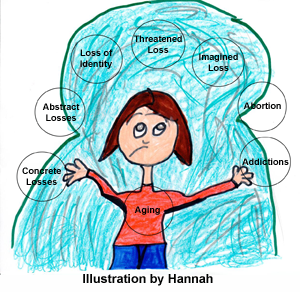 I am presently writing a series on The Grieving Process for Adults. At the beginning of the series, I invited you to take a journey with me down The Highway of Life to view losses you might have encountered on your journey through life. It is my prayer that, not only will you receive emotional and spiritual healing from losses, but it will enable you to help children when they experience a loss.
I am presently writing a series on The Grieving Process for Adults. At the beginning of the series, I invited you to take a journey with me down The Highway of Life to view losses you might have encountered on your journey through life. It is my prayer that, not only will you receive emotional and spiritual healing from losses, but it will enable you to help children when they experience a loss.
Last week, the loss that we discussed was Relationship Losses. Today, I want to draw your attention to a list of different types of losses that you might have experienced, but possibly didn’t recognize them as a loss at the time.
(Click on image for larger size)
1. Concrete Losses
Concrete losses are things we can see, touch, or feel, such as: the loss of a body part, a house fire, a stolen car.
Example: A serious stroke left Laverne paralyzed on one side of her body. She described what followed as dominos falling as loss after loss began to take place: loss of speech, the inability to walk, read and to calculate the simplest form of math. Along with these visible losses, her sense of security was lost as fear began to take over her life.
2. Abstract Losses
Abstract losses are things we cannot see, but you know it is there, such as: self-respect, hope, loss of a goal or dream, empty nest syndrome
Example: An abstract loss that affected me immensely was the empty nest syndrome. My husband and I returned home after moving our youngest daughter four hours away to college and sat down for supper. It suddenly dawned on me that nobody else would be eating supper with us. Tears began to fill my plate, as I kept listening for her car to drive up in the driveway. The eerie part came the next morning when I begin to sense the quietness of the house with no phone ringing, no loud music playing on the stereo, and no sound of water running in the shower.
Most noticeable was the absence of not just one, but two daughters who had been a part of our lives for over 20 years. I missed their presence, laughter, tears, and the heart-to-heart talks we shared. The quietness that I had once longed for was upon me, but it came with sense of loss and immense sadness.
3. Loss of Identity
“I just don’t know who I am,” is the cry of many people. Neglect, manipulation, physical, sexual or verbal abuse might be considered the major causes of our loss of identity. More subtle ways might include the roles we play in life such as wife, husband, son/daughter, our job title, etc. Things can also become a source of our identity, such as our house, job, our community standing. Many people use their performance and appearance as a source of their identity. The sad part about this loss is that it may not be realized for years.
4. Threatened Loss
Threatening losses are potential losses. You have that strange feeling of not knowing what is going to happen, and you feel threatened by it. Your sense of control is destroyed, such as: waiting for the outcome of a biopsy, your spouse saying “I’m thinking of divorcing you,” or you suspect your child might be using drugs.
Example: Pam wept in a support group about her husband’s drinking problem. Not only was she concerned about the loss of his health, but she felt “threatened” by all the additional potential losses that could occur, such as: loss of finances as he continued to soak all their money into his daily habit, the loss of their marriage and their children. Pam’s biggest threat was that someone would lose a life as he drove home night after night from his frequently visited drinking place, totally inebriated.
5. Imagined Loss
Imagined losses are losses that exists in the mind only. You imagine something might happen, and the pain is felt as though it had actually occurred.
Example: Eric told the story of the physical abuse his wife experienced by her first husband. Their own marriage was now suffering because she kept imagining that any day he would start abusing her just like her first husband had. She kept her guard up waiting for the punch that wasn’t coming, but in emotional pain as though it had.
6. Abortion
Many women are in excruciating pain from the lingering effects of having had an abortion. However, they sit in silence because of the shame that is commonly associated with women who have had an abortion. Men also suffer in silence, afraid to admit that he took part in the decision-making process of his girlfriend or wife to have an abortion.
Example: Carrie, age 28, began counseling by saying, “I don’t know who I am.” Her counselor proceeded to help her retrace her life at different age levels in an attempt to find out where she had lost sight of who she was. When the counselor reached Carrie’s age at 15, she suddenly broke out in overwhelming sobs: “I had an abortion at 15, and another abortion at 16.” During the next several counseling sessions, Carrie described the pain she had endured for 12 years because of this traumatic experience in her life. The good news of Jesus Christ is one of redemption, not one of condemnation for those who come to Him for healing.
7. Addictions
We sometimes want to write addictions off as bad choices someone has made. Again, the good news of Jesus Christ is one of redemption, not one of condemnation for those who come to Him for healing.
8. Aging
Aging is a process that starts out gradually, with losses occurring slowly in the beginning, but in later years, they seem to take on momentum. Losses that were infrequent in our younger life have suddenly taken on momentum and also a finality.
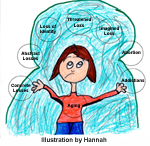 Does this list make you feel like you just want to run away from life and all of its trials? Believe me, life can be overwhelming as we try to juggle so many different types of losses.
Does this list make you feel like you just want to run away from life and all of its trials? Believe me, life can be overwhelming as we try to juggle so many different types of losses.
One of my favorite scriptures is Luke 4:18: I have come to heal the broken-hearted. That tells me that no matter what loss I have or am currently experiencing, God sees my pain, and wants to heal it.
Join Hannah and me right here next week, as we try to summarize all that we have learned about losses the last few weeks. Then I hope you will join us in The Grieving Process and receive God’s comfort as you travel down The Highway of Life.









